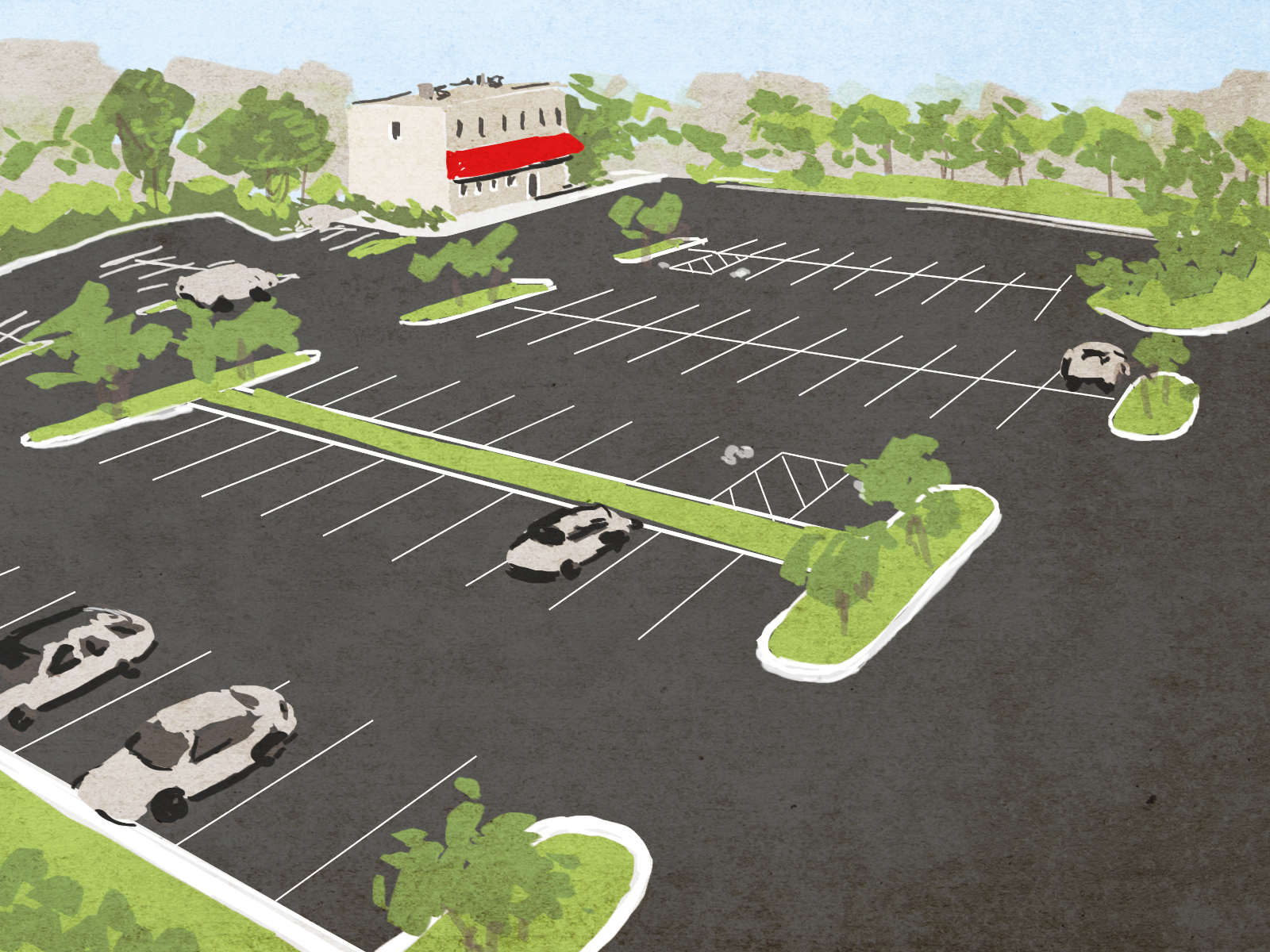COMMENT OF THE DAY: WHERE HOUSTON’S PARKING MATH DOESN’T QUITE ADD UP  “Is it typical for a municipality to use GFA (Gross Floor Area) to calculate parking requirements for businesses? Would Net Floor Area be more accurate and eliminate this debate? Gross Floor Area calculations includes things like mechanical rooms, bathrooms, hallways, storage areas, and refrigeration while Net Floor Area excludes those areas and could be considered the actual space where a business actually accommodates customers and staff. In Houston a business owner must provide a parking space for its water heater, toilets, air handler, and inventory. A little dramatic yes, but I’m not oversimplifying.” [Steskal, commenting on Here’s Everywhere Off-Street Parking Requirements Will No Longer Apply If City Council Says So] Illustration: Lulu
“Is it typical for a municipality to use GFA (Gross Floor Area) to calculate parking requirements for businesses? Would Net Floor Area be more accurate and eliminate this debate? Gross Floor Area calculations includes things like mechanical rooms, bathrooms, hallways, storage areas, and refrigeration while Net Floor Area excludes those areas and could be considered the actual space where a business actually accommodates customers and staff. In Houston a business owner must provide a parking space for its water heater, toilets, air handler, and inventory. A little dramatic yes, but I’m not oversimplifying.” [Steskal, commenting on Here’s Everywhere Off-Street Parking Requirements Will No Longer Apply If City Council Says So] Illustration: Lulu





Amen Brother!!!!
HRBO- given the number of service and delivery trucks that block roadways, park in front of residences with cooler whirring and lets not forget parking for employees, your parking lot should account for more than your patrons. Can I get an Hallelujah!?.
Typical HALF – ASS Houston arbitrary government bureaucratic ” mentality”. So screwed up.
I think that would be a step in the right direction, however, the problem is that building uses and layouts change. So a building that was a bar today with a percentage of its area utilized for kitchet, waterheaters, etc, might subsequently be a cell phone store tomorrow, or a small grocery, or a financial planning office. All of those things could potentially change the parking requirements of the facility based on your proposal. I speculate they went with “Gross area” to compensate for those changes in use.
Yes, GFA is more typical simply because it streamlines the calculation process and because the amount of net area is subject to change with remodeling, while gross area changes less often. You can get GFA from the assessor or from a survey, whereas net area would require the city to go in and measure, and negotiate on which areas should be counted, etc. But some cities do use net, or they might call it “customer service area.”
Theoretically, a gross ratio takes into account that portions of the building are unused, and a net ratio would be higher. Only buildings with an unusual amount of non-occupied space would be impacted.
The real problem is that a short table of uses and ratios pretty much guarantees that stupid things will happen, because there’s more than 50 types of buildings and business (and customer bases and neighborhoods and transit connections and …) out there. The easiest way to solve that is… market based parking. Which really only fails when it allows existing residential on-street parking from being swamped, and there’s ways to deal with that which don’t require 10 acres of parking for each big box in the burbs.
Right, but the fact that is even a thing still makes no sense.
@enginerd,
.
potential use of the site doesn’t mean that the first use has to account for the potential uses down the road. it would make it more marketable in the event of sale.
.
If I go to a site that was used as retail site, and want to open a restaurant, I may not meet parking requirements. I’ll have to change my location, or the building to suit my needs.
I like this discussion very much. Thanks to all. Those with more specific planning and development knowledge provide more ideas to consider. There’s no easy solution considering the car-centric lifestyle in Houston. It’s a real shortcoming of the quality of life here.
@melee,
In other words, the only time market based parking fails, when it “allows existing on-street parking to be swamped,” is where there’s NO MARKET, since most parts of the city don’t charge for on-street parking (and those that do charge less than nearby off-street parking). The easiest solution to the problem is to stop under-pricing on-street parking. Any good that is under-priced tends to be over-consumed.
My proposal: property owners of any block face can collectively decide the price of parking on their street, from free to $100/hr, provided EVERYONE pays it, residents included. Half of the resulting revenue is distributed to property owners, in proportion to their street frontage (minus curb cuts).
Our business is mostly GFA, but warehouse space. We have virtually no clients that come to our buisness, so it wouldn’t work for ours, either.
Nothing in these calculations is a fool-proof silver bullet.